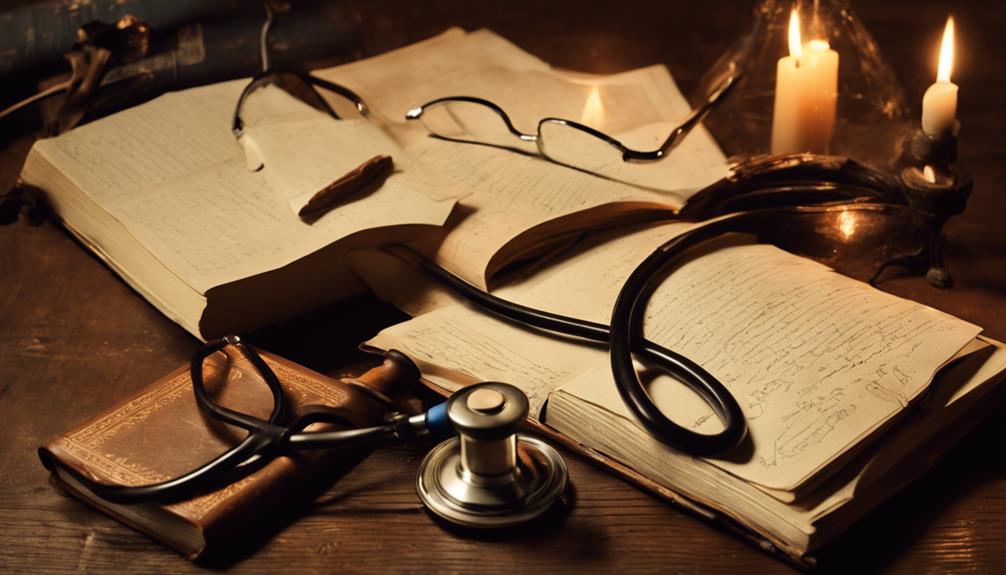As you peer into the journal of a doctor, you're about to uncover the hidden struggles that accompany the noble profession of healing. The weight of responsibility, moral injury, and emotional exhaustion can take a toll on their well-being. Coping mechanisms, self-care rituals, and mindfulness practices become essential to managing stress. The emotional impact of death, the burden of responsibility, and the weight of moral dilemmas all threaten to break the resolve of even the most resilient. Yet, in these reflections, you'll discover the quiet strength of those who wear the white coat, and the lessons they've learned about cultivating resilience in the face of uncertainty, which will only become clearer as you proceed.
Unpacking the Emotional Toll

As you investigate the doctor's journal entries, it becomes increasingly apparent that the emotional toll of their profession is a weight that's quietly, yet persistently, bearing down on their psyche. The cumulative effect of witnessing suffering, making life-or-death decisions, and confronting the limits of their expertise can lead to a profound sense of moral injury. This phenomenon, often characterized by feelings of guilt, shame, and anxiety, can erode a doctor's sense of self-worth and confidence.
Moreover, the relentless pressure to perform, combined with the emotional demands of empathizing with patients, can culminate in emotional exhaustion. As you explore further into the journal entries, you begin to appreciate the sheer emotional labor involved in being a doctor. The relentless exposure to human suffering, the burden of responsibility, and the pressure to maintain a professional demeanor can exact a devastating toll on their mental health. It's a weight that's often carried alone, hidden behind a mask of stoicism and professionalism.
Coping Mechanisms in High Stress

While the emotional toll of being a doctor can be overwhelming, you may find solace in the fact that many healthcare professionals have developed coping mechanisms to navigate high-stress environments. It's important to acknowledge that emotional exhaustion is a real concern, and it's necessary to prioritize self-care rituals to mitigate its effects. By incorporating mindfulness practices, such as meditation and deep breathing exercises, you can better manage stress and anxiety. Additionally, setting boundaries and prioritizing tasks can help you regain control over your workload and reduce feelings of burnout. It's also crucial to recognize the importance of social support networks, whether that's through colleagues, friends, or family. By fostering open and honest communication, you can create a safe space to discuss the emotional challenges of being a doctor. By adopting these coping mechanisms, you can develop resilience and better navigate the high-stress environment of the medical profession.
Death and the Doctor's Psyche
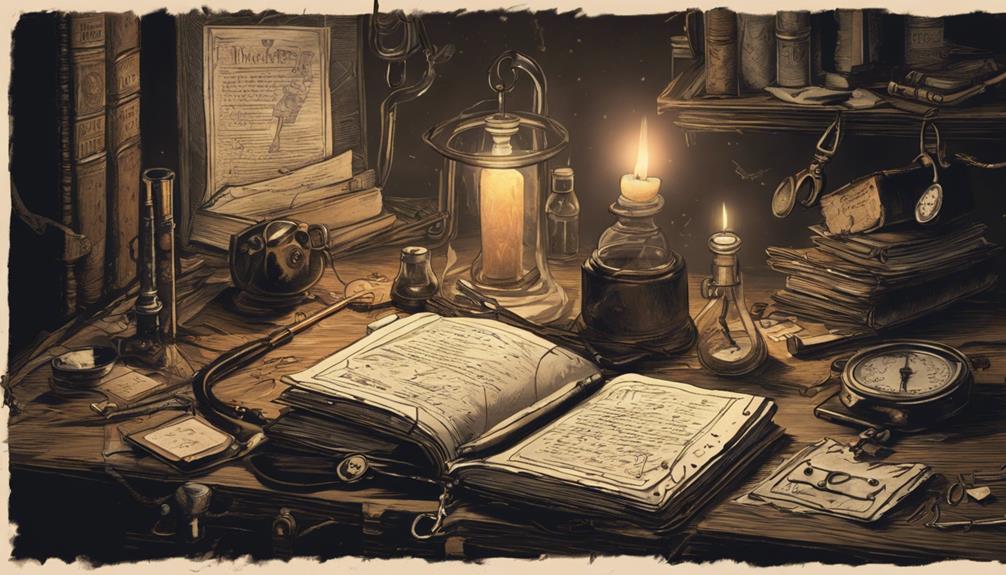
Facing death is an inescapable reality for doctors, and it's likely you'll confront the loss of a patient at some point in your career. This encounter can evoke mortal fears, as the weight of responsibility settles heavily on your shoulders. As a physician, you're trained to save lives, not lose them. The physician's burden is to navigate the emotional toll of witnessing mortality, all while maintaining a professional demeanor.
You may find yourself questioning your skills, wondering if there was something more you could've done. Self-doubt can creep in, making it challenging to separate your professional and personal emotions. It's important to acknowledge these feelings, rather than suppressing them. Recognizing the emotional impact of death can help you develop coping strategies to manage the emotional burden.
It's vital to remember that you're not alone in this experience. Your colleagues have likely faced similar situations, and seeking their support can be invaluable. By confronting and processing your emotions, you can develop a healthier perspective on mortality, ultimately strengthening your resilience as a doctor.
The Weight of Responsibility
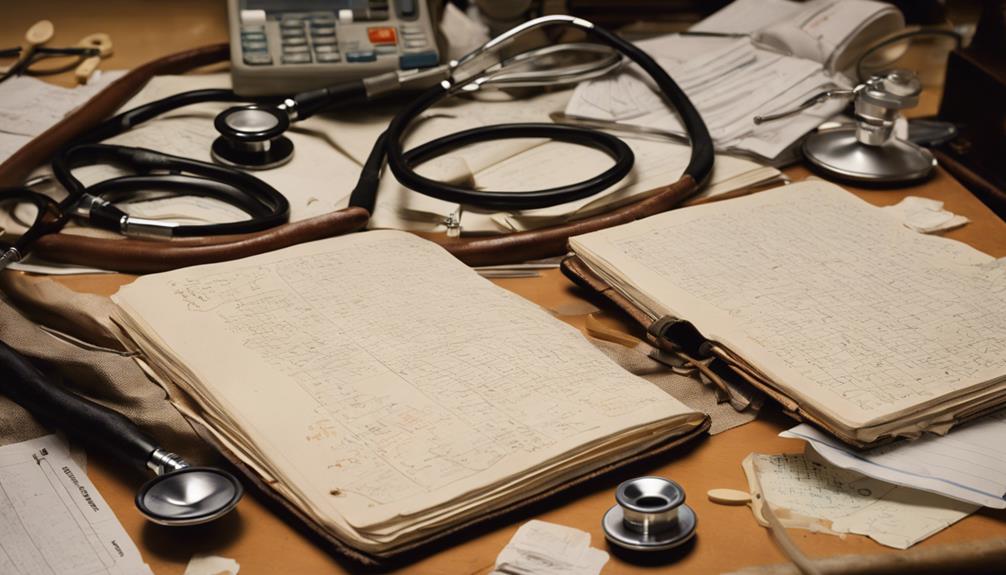
You carry the weight of responsibility like a mantle, its heaviness settling upon your shoulders with each life-altering decision. As a doctor, the burden of responsibility is a constant companion, weighing heavily on your conscience. Every diagnosis, every treatment, every decision carries the potential to alter the course of a patient's life. Medical burdens weigh heavily on your mind, as you grapple with the moral dilemmas that arise with each case. Should you prioritize the patient's autonomy or step in to guarantee their well-being? Each decision is a delicate balance of ethics and compassion, with the patient's life hanging in the balance.
The weight of responsibility is crushing at times, as you navigate the complex web of medical ethics and moral obligations. You must confront the possibility of error, of misdiagnosis, of unintended consequences. Yet, you press on, driven by a deep commitment to your patients and a passion for healing. The weight of responsibility is a constant reminder of the gravity of your role, a role that demands wisdom, empathy, and courage in the face of uncertainty.
Finding Solace in Resilience

In the midst of turmoil, your resilience serves as a beacon of solace, a demonstration of the human spirit's capacity to persevere in the face of adversity. It's a demonstration of your inner strength, a quality that's forged through experience, self-reflection, and deliberate practice. As a healthcare professional, you've likely developed coping mechanisms to navigate the emotional demands of your work. Self-care routines, such as meditation, journaling, or exercise, can help you recharge and maintain your emotional equilibrium. These habits not only mitigate the risk of burnout but also enhance your capacity for empathy and compassion. By cultivating resilience, you're better equipped to confront the challenges inherent to your profession, from maneuvering through complex medical cases to coping with the emotional toll of patient loss. By acknowledging and nurturing your inner strength, you're able to find solace in the face of adversity, and emerge stronger, wiser, and more compassionate as a result.
Compassion in the Face of Suffering

As healthcare professionals navigate the complexities of their work, they're constantly reminded that compassion is not only a virtue, but a necessity in the face of suffering, where empathy and kindness can be a balm to those in pain. You've likely encountered statistics that highlight the staggering prevalence of suffering: over 50 million adults in the US alone experience chronic pain, while millions more cope with mental health disorders. But it's the patient stories that truly drive home the importance of compassion. You've seen it in the eyes of a mother who's lost her child, or in the frail body of an elderly patient struggling to come to terms with their mortality. These stories underscore the significance of empathy in the healing process. When you take the time to listen, to truly hear the fears and concerns of your patients, you're not only alleviating their emotional pain but also fostering trust and facilitating better health outcomes. In the face of suffering, compassion is not a luxury, but a fundamental aspect of quality care.
The Human Side of Medicine

Delving into the intricacies of healthcare, one discovers that the human side of medicine is often obscured by the shiny veneer of cutting-edge technology and evidence-based protocols. As you navigate the complex landscape of medical practice, you begin to realize that the most significant challenges often stem from the human element, rather than the medical condition itself. You've likely experienced moments of medical camaraderie, where shared experiences and collective knowledge foster a sense of unity among healthcare professionals. However, it's equally important to acknowledge the personal biases that can influence your decision-making, potentially affecting patient care. You must recognize that these biases can be subtle, yet pervasive, and aim to remain aware of them in your daily practice. By doing so, you'll cultivate a more empathetic and nuanced approach to medicine, one that acknowledges the intricate dance between medical science and human connection.
Balancing Empathy and Objectivity
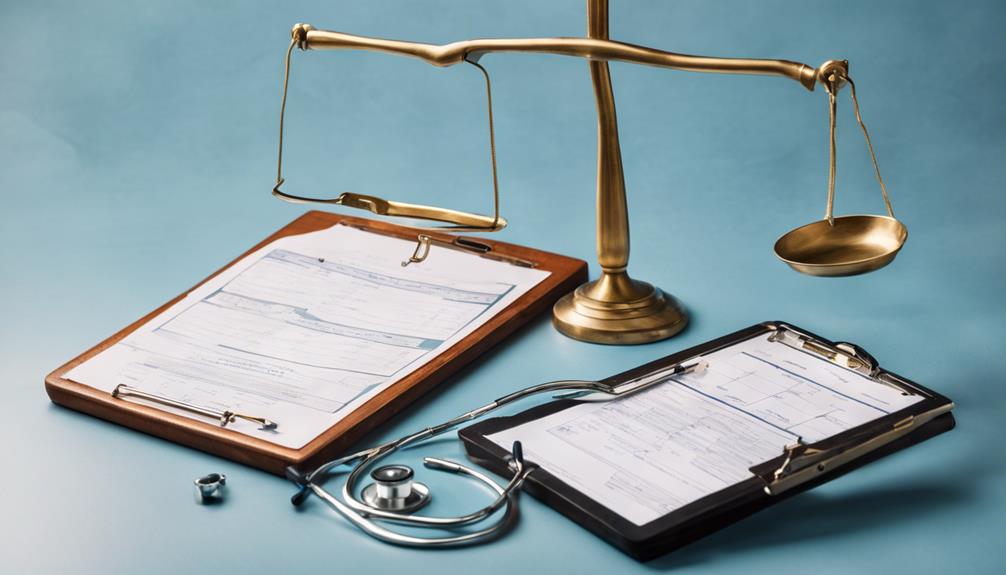
Your pursuit of empathy in patient care must be deliberately counterbalanced with objectivity to guarantee that emotions, however well-intentioned, don't overshadow medical judgment. As a healthcare professional, you've likely encountered situations where your emotional investment in a patient's well-being threatened to cloud your judgment. This is where boundary setting and professional distance come into play. By establishing clear boundaries, you can maintain a level of emotional detachment that allows you to make informed, objective decisions. This doesn't mean suppressing your emotions entirely, but rather, acknowledging and managing them in a way that doesn't compromise your medical expertise. By striking this delicate balance, you can provide compassionate care without sacrificing the objectivity that's essential to effective diagnosis and treatment. Remember, your emotional intelligence is a valuable asset, but it must be tempered with the rational, analytical thinking that defines your profession.
When Patients Leave a Mark
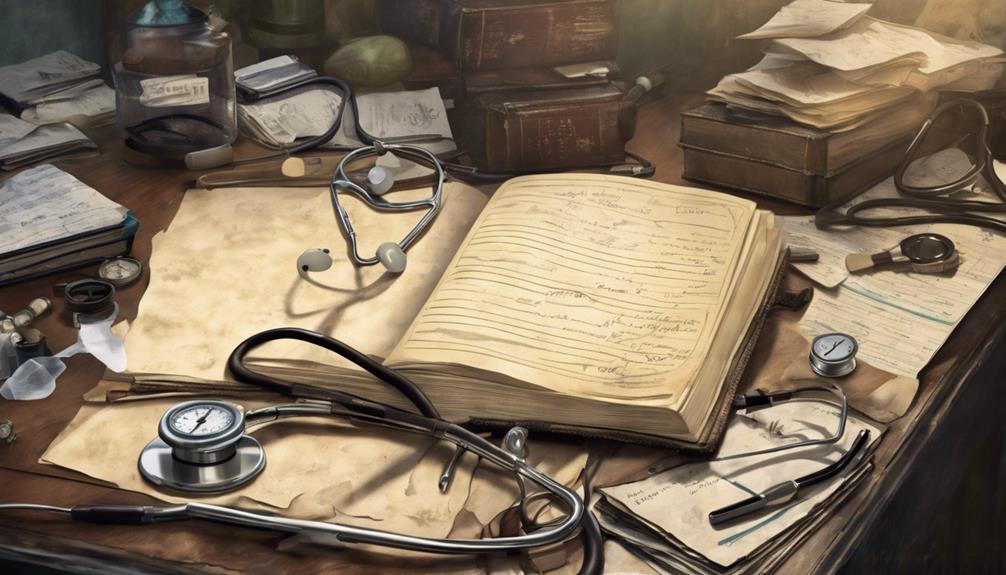
While maneuvering the delicate balance between empathy and objectivity, you've likely encountered patients who have left an indelible mark on your psyche, their stories and struggles lingering long after they've left your care. These individuals often evoke strong emotions, making it challenging to maintain a professional distance. You may recall the patient who lost trust in the medical system due to a previous misdiagnosis, or the one whose scarred memories of past traumas still linger. Their experiences can leave you questioning your own abilities, forcing you to confront the limitations of your profession. As you reflect on these cases, you're reminded that the relationship between doctor and patient is a complex dance of trust, empathy, and understanding. The memories of these patients can be a heavy burden, but they also serve as a poignant reminder of the impact you can have on a person's life. By acknowledging the emotional toll of these encounters, you can refine your approach to care, cultivating a deeper sense of compassion and understanding.
Healing Hands and Heavy Hearts
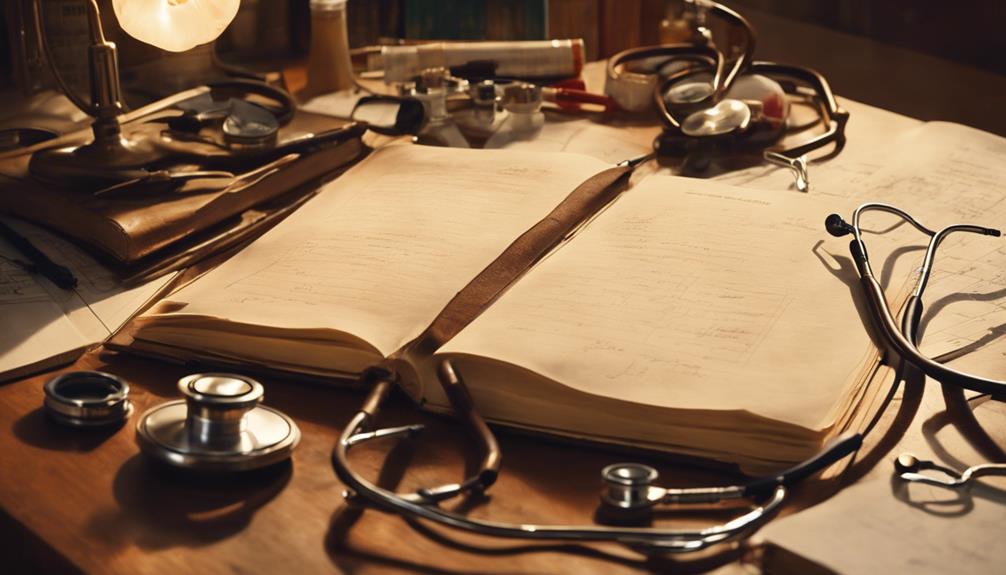
One of the most poignant paradoxes in medicine is that the very hands that heal can also harbor heavy hearts, burdened by the weight of patient stories and the emotional toll of compassionate care. As you explore the intricacies of your medical career, you're reminded that the price of healing others often comes at a personal cost. The weight of medical martyrdom, where selfless sacrifice is expected and even glorified, can be crushing. You're forced to reconcile the joy of saving lives with the anguish of losing patients, the guilt of not being able to save them all, and the moral distress of making impossible choices.
As you investigate deeper into the world of medicine, you begin to realize that the true cost of healing goes beyond the physical domain. The emotional toll of compassionate care, the weight of heavy hearts, and the burden of patient stories all take their toll on your mental and emotional well-being. It's a delicate balancing act, where the pressure to heal others can sometimes come at the expense of your own healing. As you continue on this journey, it's crucial to recognize the importance of self-care, to acknowledge the heavy hearts that heal, and to prioritize your own well-being in the process.
Frequently Asked Questions
How Do Doctors Overcome the Emotional Burden of Frequent Patient Losses?
When you're a doctor, facing patient losses is an unfortunate reality. To cope, you develop coping mechanisms, like compartmentalizing emotions or finding solace in successes. However, it's essential to acknowledge the emotional toll. Through self-reflection, you recognize the weight of each loss, allowing yourself to process grief. This introspection helps you develop emotional resilience, enabling you to continue providing empathetic care to your patients.
Can a Doctor's Emotional Toll Affect Their Medical Judgment and Decision-Making?
Like a puzzle piece that doesn't quite fit, emotional toll can disrupt a doctor's judgment, leading to misdiagnosis or delayed treatment. When you're overwhelmed, it's like trying to navigate a stormy sea without a compass. Burnout prevention is essential, as emotional exhaustion can cloud your medical judgment. Establishing empathy boundaries is key, allowing you to care for patients without sacrificing your own well-being. By prioritizing self-care, you can maintain a clear head and make sound decisions, ensuring the best possible outcomes for your patients.
Do Doctors Ever Feel Guilty for Not Being Able to Save a Patient's Life?
You're likely no stranger to the weight of medical regrets, wondering what you could've done differently. It's crucial to feel guilty when a patient's life slips through your fingers. The what-ifs can be overwhelming, as you relive the moments leading up to the loss. You might even internalize the patient's blame, questioning your own competence. It's vital to acknowledge these emotions, allowing yourself to process and learn from them, rather than letting them consume you.
How Do Doctors Balance Their Personal and Professional Relationships With Patients?
As you navigate the delicate dance of doctor-patient relationships, you're like a tightrope walker, balancing personal connections with professional boundaries. Boundary setting is key, allowing you to empathize without becoming emotionally entangled. You must walk this fine line, fostering trust without compromising objectivity. By doing so, you'll cultivate meaningful relationships that prioritize patients' needs while maintaining a healthy emotional distance, ensuring you can provide the best care possible.
Can a Doctor's Emotional Resilience Be Developed Through Training and Practice?
As you explore the world of emotional resilience, you realize that it's not an inherent trait, but rather a skill that can be honed through training and practice. Developing emotional intelligence is key, allowing you to navigate complex patient relationships while maintaining your own mental wellness. By cultivating self-awareness, empathy, and effective stress management, you can build a strong foundation for emotional resilience, ultimately improving your ability to provide compassionate care.
